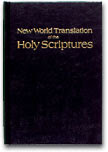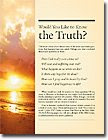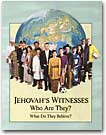William Barclay: "Theos [in John 1:1c] becomes a description, and more of an adjective than a noun...[John] does not say that Jesus was God"
-Scholar, "Many Witnesses, One Lord"
Hans-Jürgen Becker-"Ein Gott war der Logos (a god was the Logos)
-Bible Translator, Das Evangelium nach Johannes
Jason BeDuhn-"The bottom line is that 'The Word was a god' is exactly what the Greek says. "The Word was divine" is a possible meaning of this Greek phrasing. "The Word was God" is almost certainly ruled out by the phrasing John uses."
-Scholar in his book: "Truth in Translation: Accuracy and Bias in English Translations of the New Testament"
Lant Carpenter LL.D-“a God”
-Scholar, in "Unitarianism in the Gospels"
C.H. Dodd-"A possible translation. . . would be, 'The Word was a god’. As a word-for-word translation it cannot be faulted."
-Professor; director of the New English Bible project
S.G. Green-"'The Word' of John 1:1 is not the same god as the God with whom the Word is said to be. Hence, the omitting of the article in the predicate of the simple sentence is shown to be only a general rule, and not one that holds in every case. One such case where that general rule does not hold true is John 1:1. The definite article "the" was there omitted, but not according to that general rule; it was not omitted with the idea that it should be understood by the reader."
-Scholar, "Green's Handbook to the Grammar of the Greek Testament"
Ernst Haenchen-"In this instance, the verb ‘was’ ([en]) simply expresses predication. And the predicate noun must accordingly be more carefully observed: [the·os´] is not the same thing as [ho the·os´] (‘divine’ is not the same thing as ‘God’)
-"Das Johannesevangelium. Ein Kommentar, John 1". (Gospel According to John, A Commentary on John 1)
Murray J. Harris-"From the point of view of grammar alone, [John 1:1c] could be rendered 'the Word was a god'"
-Scholar in his book: "Jesus as God"
Herman Heinfetter-“a God”
-Scholar in his book: "Rules for Ascertaining the Sense Conveyed in Ancient Greek Manuscripts"
George Horner-"[A]nd (a) God was the word."
-Scholar in his book, "The Coptic Version of the New Testament"
A. N. Jannaris, Ph.D-"a god”
-Scholar and Lecturer on Post-Classical and other Greek dialects and author of "An Historical Greek Grammar"
Felix Just-"and god[-ly/-like] was the Word."
-Professor, Loyola Marymount University
William Loader-"a god”
-Scholar, New Testament Lecturer for the Perth Theological Hall and teacher at Murdoch University
Jon Madsen-"the Word was a divine Being"
-"New Testament A Rendering"
Julius R. Mantey-"Instead of translating John 1:1, and the word was deity, this Grammar could have translated it, 'and the word was a god.'"
-Scholar, "A Manual Grammar of the Greek New Testament"
John L. McKenzie-John 1:1c "should rigorously be translated 'a divine being'"
-Scholar, "A Dictionary Of The Bible"
James Moffatt-"the Word was divine."
-Bible Translator and Scholar, from Moffatt's New Translation of the Bible
Thomas Belsham-"and the word was a god"
-Bible translator in association with Unitarian Bible Translation Committee
Andrews Norton-“a god”
-Scholar, "A Statement of Reasons For Not Believing the Doctrines of Trinitarians"
A.M. Perry-"John 1:1 indefinite with qualitative force...’a god”.
-Theologian, "Journal of Biblical Literature"
Joseph Priestley-“a God”
-Greek Scholar, "A Familiar Illustration of Certain Passages of Scripture..."
Robert Harvey Strachen-"divine, a divine being"
-Scholar, "The Historic Jesus in the New Testament"
Johannes Schneider-"Und Gottlicher Art war der Logos." (and godlike sort was the Logos.)
-Scholar, "Das Evangelium nach Johannes (The Gospel of John)"
Siegfried Schultz-"Ein Gott (oder: Gott von Art) war das Wort." (and a god (or, of a divine kind) was the Word.)
-Scholar, "Das Evangelium nach Johannes (The Gospel of John)"
Vincent Taylor-"Here, in the Prologue, the Word is said to be God, but as often observed, in contrast with the clause, 'the Word was with God', the definite article is not used (in the final clause). For this reason it is generally translated 'and the Word was divine' or is not regarded as God...In neither passage is Jesus unequivocally called God."
Scholar, "Does the New Testament Call Jesus God?"
C.C. Torrey-"In the beginning was the Word, and the Word was with God, and the Word was god."
-Scholar and Bible Translator
J. W. Wenham-"As far as grammar alone is concerned, John 1:1c could mean either, 'The Word is a god', or 'The Word is the god.'"
-Scholar, "Elements of NT Greek"
Paul Wernle-“a God”
-Professor Extraordinary of Modern Church History at the University of Basil, The Beginnings of Christianity
Benjamin Wilson-"and a god was the word."
-Scholar and Bible Translator
Robert Young-"a God”
-Scholar, "Concise Commentary on the Holy Bible"
"This is the Way, walk in it, you people."-Isaiah 30:21
Blog Archive
-
▼
2009
(60)
-
▼
Jan 2009
(12)
- Thank You, Jehovah
- Moving Mountains With a Word
- What About...John 8:58?
- What About...John 10:30?
- Scholarly Quotes on the New World Translation
- Scholarly Quotes on John 1:1
- Holy Spirit Helps God's People
- What Jehovah's Witnesses Believe
- Scenes from My Christian Walk
- Worship the Father; Follow the Leader
- Is Jesus Coming Back?
- A Letter to a Dear Friend
-
▼
Jan 2009
(12)
Your Personal Invitation


Websites of Interest
Other Jehovah's Witness Sites
- Our Spiritual Heritage
- How Theology and Bias Affect Bible Translation
- In Defense of the New World Translation
- Bible Translation and Study
- Jerusalem 607 B.C.E.
- Theocratic Resources
- Jehovah's Witnesses United
- The Jehovah's Witnesses and the United Nations
- Setting the Record Straight
- JW Brothers
- Face the Facts
- Quoted Statements
- David Silver's Website
- Serving Jehovah in Foreign Lands
Other Jehovah's Witness Blogs
Videos of Interest
Various Sign-Language Videos (Would You Like to Know the Truth?)
- American Sign Language
- Australian Sign Language
- Brazilian Sign Language
- British Sign Language
- French Sign Language
- German Sign Language
- Greek Sign Language
- Italian Sign Language
- Japanese Sign Language
- Korean Sign Language
- Mexican Sign Language
- Portuguese Sign Language
- Russian Sign Language
- Spanish Sign Language
All of the books appearing below are distributed for FREE by Jehovah's Witnesses. They are all based on the Bible and should not be read without the Holy Word so as to prove to yourself that what is contained in these books are actually Bible-based. Contact Jehovah's Witnesses locally in your area or write to the appropriate address found at the "Official Website of Jehovah's Witnesses" linked above.
New World Translation of the Bible (Clickable Picture)
Would You Like to Know the Truth? (Clickable Picture)
What Does God Require of Us? (Clickable Picture)
Jehovah's Witnesses--Who Are They? What Do They Believe? (Clickable Picture)
Look! I Am Making All Things New (Clickable Picture)
Should You Believe in the Trinity? (Clickable Picture)
When Someone You Love Dies (Clickable Picture)
How Can Blood Save Your Life? (Clickable Picture)
What Does the Bible Really Teach?

Explains the Basic Teachings in the Bible
Keep Yourselves in God's Love

Used in Bible studies with advanced students, this book explains practices to avoid so as to remain in God's favor
Draw Close to Jehovah

Explains the Four Dominant Qualities of God and How They Draw Us to Him
The Greatest Man Who Ever Lived
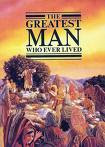
Takes the Life of Jesus Christ from the Four Gospels and Presents them in Chronological Order
Come, Be My Follower

Explains Who Jesus Is and Why We Should Follow His Example in Our Daily Life
Pay Attention to Daniel's Prophecy

Explains the Book of Daniel in a Verse-by-Verse Format and Shows How His Book Has Meaning For Us Today
Live With Jehovah's Day in Mind
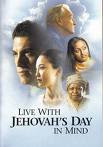
Takes an In-Depth Look at the Twelve "Minor" Prophets and Shows How Their Writings Benefit Us Today
The Secret to Family Happiness

Shows From the Bible What Families Can Do to Survive in This World Today
My Book of Bible Stories
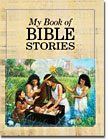
Takes the Most Famous and Loved Stories From the Bible and Presents Them for Children--Fully Illustrated
Is There a Creator Who Cares About You?

Using the Latest Understanding in the Scientific Field and the Bible to Prove That There is a Creator
Mankind's Search for God
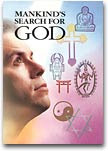
Gives an Overview of all the Major Religions of the World Including Islam, Judaism, Hinduism, Buddhism, and More
Knowledge That Leads to Everlasting Life

This is an older book that was at one time used by Jehovah's WItnesses to teach basic Bible doctrine
Jehovah's Witnesses--Proclaimers of God's Kingdom

This book presents the entire modern-day history of the Jehovah's Witnesses and their organization up until the year of publication--1993
All Scripture Is Inspired of God and Beneficial
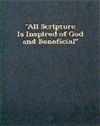
A Book That Gives a Brief Review of Each Book of the Bible, Examines the History of Each Book, Why It Was Written, and More!
Insight on the Scriptures
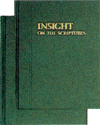
A Two-Volume Bible Encyclopaedia That Explains Every Person, Place, Thing, and Event in the Bible
The Watchtower Magazine
The Awake! Magazine
Jehovah God
Jesus Christ
- Jesus Christ-Who Was He?
- Is Jesus Christ God?
- A Birth to Be Remembered
- Lessons Jesus Taught-Are They Practical?
- Jesus' Miracles--Fact or Fiction?
- Reliving Jesus' Last Days on Earth
- The Resurrection of Jesus-Fact or Legend?
- Jesus Saves--How?
- How Jesus Can Change Your Life
- Christ's Coming-How Does It Affect You?
The Bible's Viewpoint
- What Was the Original Sin?
- What Happens at Death?
- Should You Pray to the Virgin Mary?
- Should Icons Be Used In Worship?
- Should Christians Expect Divine Protection?
- Prayers That Are Heard By God
- Is There Only One True God?
- Is the Holy Spirit a Person?
- Is It Wrong to Drink Alcoholic Beverages?
- Do Humans Become Angels When They Die?
- Does the Bible Discriminate Against Women?
- Does Science Contradict the Creation Account?
- Does God Approve of Same-Sex Marriage?
- Did Jesus Really Die on a Cross?
The Bible in Your Life
- What Hope for the Poor?
- Keep Your Children Safe!
- Why Care About Spiritual Things?
- Blood--Why So Valuable?
- Enjoy Family Life
- How Can You Find Inner Peace?
- Should You Live Only For Today?
- How Can You Benefit From Godly Principles?
- You Cannot Save It, So Use It Well
- Building on Pagan Foundations
- Hope--Where Can You Find It?
Biblical Answers to Questions Young People Ask
- Why So Many Rules?
- Why Does God Let Us Suffer?
- What's Wrong With Premarital Sex?
- How Can I Stop the Gossip?
- How Can I Help Those In Need?
- How Can I Cope When Trajedy Strikes?
- How Can I Avoid Getting Involved With the Wrong People?
- Homosexuality--How Can I Avoid It?
- Dabbling in the Occult--What's the Harm?
Visitors
The Bible says, "The heavens declare the glory of God; the skies proclaim the work of his hands." (Psalm 19:1) When we consider the marvelous works of our God, it should move us to "bend [our] knees" to Him. (Ephesians 3:14) Let us all be moved to thank our God and Father for all he has done for us. In the words of King David: "Every breathing thing--let is praise Jah. Praise Jah you people!"-Psalm 150:6

